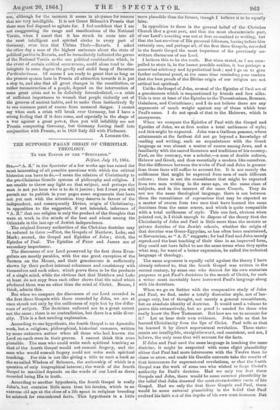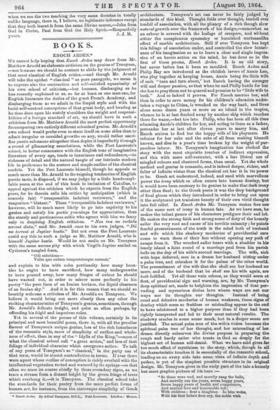THE SUPPOSED PAGAN ORIGIN OF CHRISTIAN. THEOLOGY.
To THE EDITOR OF THE " SPECTATOR."
Belfast, July 13, 1864. Sin,—" A. Z." in the Spectator of a few weeks ago has raised the most interesting, of all possible questions with which the critical historian can have to do,—I mean the relation of Christianity to the pre-Christian Gentile systems of philosophy and religion. I am unable to throw any light on that subject, and perhaps the man is not yet born who is to do it justice ; but I trust you will permit me to publish in your pages some arguments that have not yet met with the attention they deserve in favour of the independent, and consequently Divine, origin of Christianity, in opposition to the suggested, if not intended, inference of "A. Z." that our religion is only the product of the thoughts that were at, work in the minds of the best and wisest among the Orientals in the last age of Jewish independence.
The original literary authorities of the Christian doctrine may be reduced to three :—First, the Gospels of Matthew, Luke, and Mark; second, the Gospel and Epistles of John ; third, the Epistles of Paul. The Epistles of Peter and James are of secondary importance.
The discourses of our Lord preserved by the first three Evan- gelists are mostly parables, with the one great exception of the Sermon on the Mount, and their genuineness is sufficiently shown by their perfect internal coherence and consistency with themselves and each other, which prove them to be the products of a single mind, while the obvious fact that Matthew and Luke at least do not copy from each other shows that the mind which produced them was no other than the mind of Christ. Renan, I think, admits this.
But when we compare the discourses of our Lord recorded in the first three Gospels with those recorded by John, we are at once struck not only by the unlikeness of style but by the differ- euce of subject. The doctrines enforced are to a great extent not the same ; there is no contradiction, but there is a wide diver- sity. This is a fact needing explanation.
According to one hypothesis, the fourth Gospel is no Apostolic work, but a religions, philosophical, historical romance, written by some unknown author when all those who had known the Lord on earth were in their graves. I cannot think this even plausible. The man who could write such spiritual teaching as that of the fourth Gospel would not commit forgery, and the man who would commit forgery could not write such spiritual teaching. For this is not like giving a title to such a book as the so-ealled Wisdom of Solomon, the authorship of which is a question of only biographical interest; the worth of the fourth Gospel to mankind depends on the words of our Lord as there recorded being His in truth.
According to another hypothesis, the fourth Gospel is really John's, but contains little more than his fancies, which in an extreme old age at the close of a life spent in religious brooding he mistook for rem3mbered facts. This hypothesis is a little more plausible than the former, though I believe it to be equally false.
In opposition to these is the general belief of the Christian Church that a great part, and that the most characteristic part, of our Lord's teaching was not at first committed to writing, but that the last survivor of His personal followers, having before him certainly one, and perhaps all, of the first three Gospels, recorded in the fourth Gospel the most important of the previously u n - written discourses of our Lord.
I believe this to be the truth. But when stated, as I am com- pelled to state it, in the barest possible outline, it has perhaps a somewhat arbitrary and hypothetical look ; and I go on to give farther collateral proof, at the same time reminding your readers that the best proofs of the Divine origin of our religion are not critical but spiritual.
Unlike the Gospel of John, several of the Epistles of Paul are of a genuineness which is unquestioned by friends and foes alike. This is true at least of the Epistles to the Thessalonians, Romans, Galatians, and Corinthians ; and I do not believe there are any arguments of much weight against any of those which bear Paul's name. I do not speak of that to the Hebrews, which is anonymous.
When we compare the Epistles of Paul with the Gospel and Epistles of John, we at first notice a total unlikeness of style; and this might be expected. John was a Galilean peasant, whose attainments at the farthest did not go beyond a knowledge of reading and writing, such an acquaintance with the Greek language as was almost a matter of course among Jews, and a familiarity with the sacred literature and traditions of his country. Paul, on the contrary, was a scholar,—a man of double oulture, Hebrew and Greek, and thus essentially a modern like ourselves. But the difference between the works of Paul and John is greater than those facts will suffice to account for. It is not merely the unlikeness that might be expected from men of such different culture ; there is not the resemblance that might be expected from two men writing in the same age, on the same class of subjects, and in the interest of the same Church, They do not use the same theological language, there is not between them the resemblance of expressions that may be expected as a matter of course from two men that have learned the same doctrines from the same source, and which is quite compatible with a total unlikeness of style. This one fact, obvious when pointed out, is I think enough to dispose of the theory that the Christianity of John and Paul is little more than the esoteric or private doctrine of the Jewish schools, whether the origin of that doctrine was Greco-Egyptian, as has often been maintained, or Zoroastrian, as " A. Z." suggests ; for had Paul and John merely reproduced the best teaching of their time in an improved form, they could not have failed to use the same terms when they spoke what may, for want of a better expression, be called the technical language of theology.
The same argument is equally valid against the theory I have already referred to, that the fourth Gospel was written in the second century, by some one who desired for his own sectarian purposes to put Paul's doctrines in the mouth of Christ, for such a writer must inevitably have borrowed Paul's language along with his doctrines.
When we go on farther with the comparative study of John and Paul, we find, under a totally dissimilar style, not of lan- guage only, but of thought, not merely a general resemblance, but an absolute identity of doctrine. It would need a volume to prove this exhaustively, but no proof is needed for those who really know the New Testament. But how are we to account for it ? Let us hear their own evidence. John tells us that he learned Christianity from the lips of Christ. Paul tells us that ho learned it by direct supernatural revelation. These state- ments are intelligible, straightforward, and consistent, and are, I believe, the only ones that will account for the facts.
If John and Paul used the same language in teaching the same doctrine, it might be suspected with some slight plausibility either that Paul had more intercourse with the Twelve than he chose to avow, and made his Gentile converts take the results of that intercourse for supernatural revelations, or that the fourth Gospel was the work of some one who wished to forgo Christ', authority for Paul's doctrine. Had we only the first three Gospels and John, there would be some external plausibility br the belief that John dreamed the most characteristic parts of his Gospel. Had we only the first three Gospels and Paul, there would be some external plausibility in the belief that Paul evolved his faith oat of the depths of his own coneziousuess. But
when we see the two teaching the very same doctrine in totally unlike language, there is, I believe, no legitimate inference except that they both learnt it from the same Divine sources—John from God in Christ, Paul from God the Holy Spirit.—Respectfully































 Previous page
Previous page